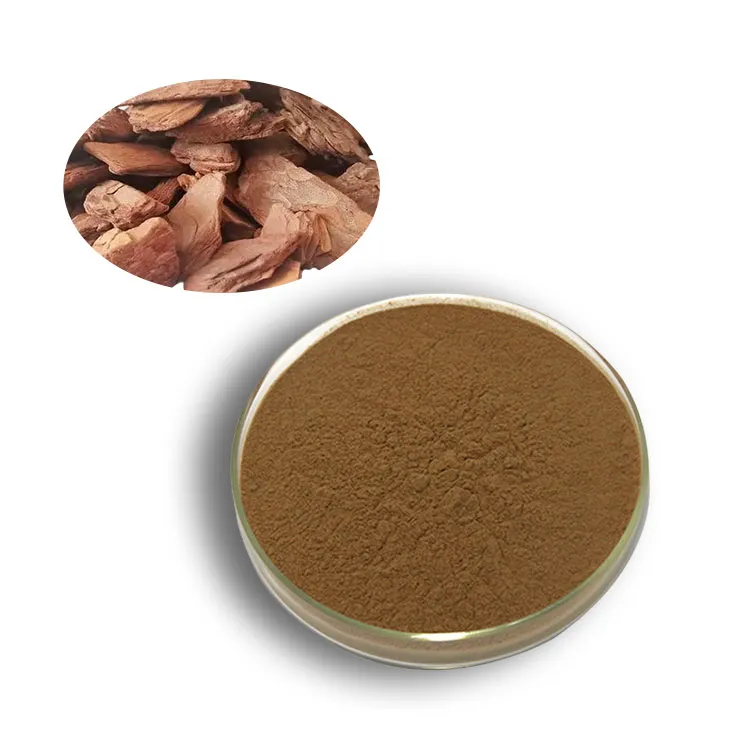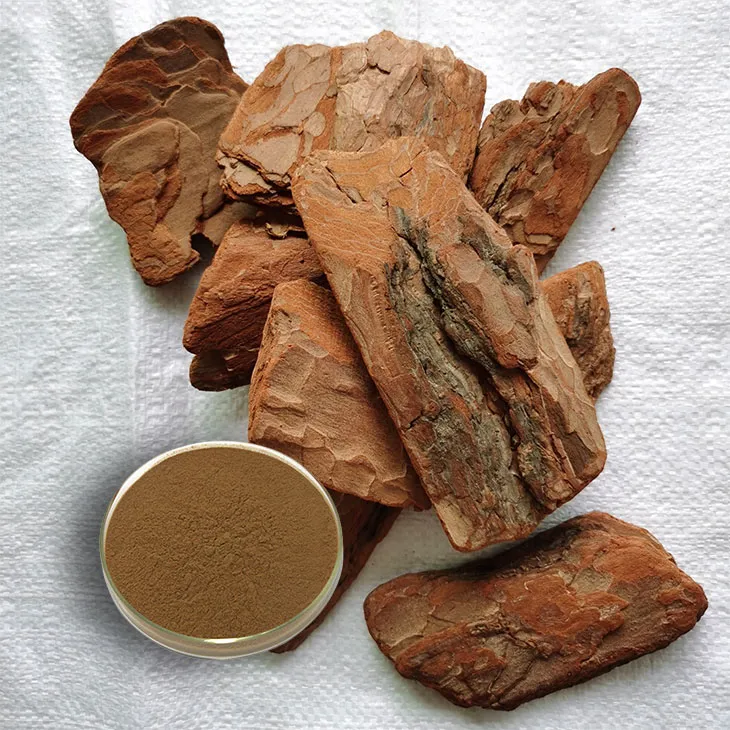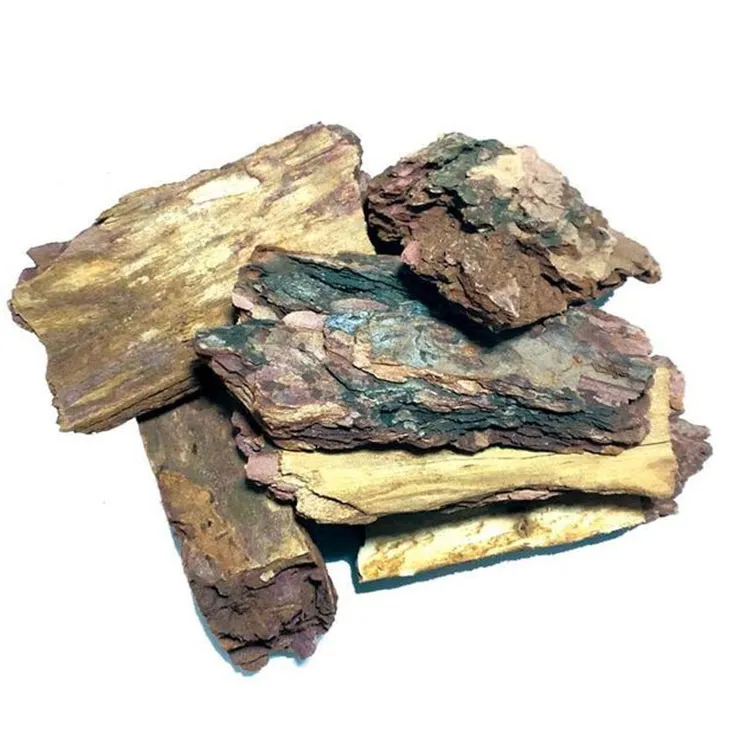- 0086-571-85302990
- sales@greenskybio.com
Five Reasons for Using Pine Bark Extract Powder in the Food Industry.
2024-12-10

1. Rich in Antioxidants
Antioxidants are substances that can prevent or slow damage to cells caused by free radicals, unstable molecules that the body produces as a result of normal metabolism. Pine bark Extract Powder is a great source of antioxidants. These antioxidants play a crucial role in the food industry for several reasons.
During food processing and storage, oxidative processes can occur. Oxidation can lead to the degradation of food quality, such as the development of off - flavors, discoloration, and loss of nutritional value. For example, fats in food can become rancid due to oxidation. The antioxidants in Pine bark Extract Powder can intercept free radicals and prevent or slow down these oxidative reactions. This helps to maintain the freshness, flavor, and nutritional integrity of the food.
Moreover, in a consumer - driven market, consumers are increasingly aware of the health benefits of antioxidants. By incorporating Pine bark Extract Powder into food products, manufacturers can offer products with added antioxidant value. This can attract health - conscious consumers who are looking for foods that can help them combat oxidative stress in their bodies.

2. Boosts Immunity
The immune system is the body's defense mechanism against diseases. A strong immune system is essential for overall health. Pine bark extract powder has been found to have positive effects on immunity, which makes it a valuable ingredient in the food industry.
It contains bioactive compounds that can stimulate the immune system. These compounds can enhance the function of immune cells, such as macrophages and lymphocytes. Macrophages are responsible for engulfing and destroying foreign invaders, while lymphocytes play a key role in recognizing and eliminating specific pathogens. By strengthening these immune cells, pine bark extract powder can help the body better resist infections.
In the context of food, products fortified with pine bark extract powder can be marketed as immune - boosting foods. This is especially appealing during cold and flu seasons or in times when people are more concerned about their immune health. For example, it could be added to functional foods like energy bars or health drinks.

3. Anti - Aging Effects
Aging is a complex process that involves various physiological changes at the cellular level. Pine bark extract powder is known for its anti - aging effects, which are highly relevant in the food industry.
At the cellular level, it can protect cells from damage caused by factors such as oxidative stress and inflammation. This helps to maintain the normal function of cells. For instance, it can prevent the shortening of telomeres, the protective caps at the ends of chromosomes. Telomere shortening is associated with cellular aging. By protecting telomeres, pine bark extract powder can potentially slow down the aging process of cells.
In the food market, anti - aging is a popular concept. Consumers are interested in products that can help them maintain a youthful appearance and good health as they age. Incorporating pine bark extract powder into foods like skin - healthy snacks or anti - aging supplements can target this consumer demand.

4. Acts as a Natural Preservative
Food preservation is a major concern in the food industry. Traditional artificial preservatives have faced some criticism due to potential health risks and consumer preference for more natural products. Pine bark extract powder offers a natural alternative as a preservative.
It has antimicrobial properties that can inhibit the growth of bacteria, yeast, and molds. These microorganisms are the main causes of food spoilage. By preventing their growth, pine bark extract powder can help to extend the shelf - life of food products. For example, in bakery products, it can prevent the growth of mold, allowing the products to stay fresh for a longer period.
Using natural preservatives like pine bark extract powder also meets the trend of clean - label products. Consumers are more likely to choose products with natural ingredients and fewer artificial additives. This can give food manufacturers a competitive edge in the market.
5. Natural and Sustainable Ingredient
In today's food market, there is a growing demand for natural and sustainable ingredients. Pine bark extract powder fits this requirement well.
It is a natural ingredient derived from pine trees. The extraction process can be carried out in an environmentally - friendly manner. For example, sustainable forestry practices can ensure a continuous supply of pine bark without causing harm to the forest ecosystem.
Moreover, being a natural ingredient, it is often perceived as a healthier option compared to synthetic alternatives. This can enhance the appeal of food products containing pine bark extract powder, especially among consumers who are concerned about the origin and nature of the ingredients in their food.
FAQ:
What are the main antioxidants in pine bark extract powder?
Pine bark extract powder contains various antioxidants, such as proanthocyanidins. These antioxidants are effective in scavenging free radicals and preventing oxidative damage to cells.
How does pine bark extract powder strengthen the immune system?
It may enhance the immune system by modulating the body's immune responses. For example, it can stimulate the activity of certain immune cells, which in turn helps the body to better defend against pathogens.
Can pine bark extract powder be used in all types of food as a natural preservative?
While it has preservative properties, it may not be suitable for all types of food. Its effectiveness can vary depending on factors such as the pH, water activity, and composition of the food. However, in many products like baked goods and some beverages, it can be a viable natural preservative option.
What is the scientific evidence for the anti - aging effects of pine bark extract powder?
Studies have shown that its anti - aging effects are related to its ability to protect cells from oxidative stress. By reducing oxidative damage at the cellular level, it can help maintain normal cell function and slow down the aging process. For example, research has demonstrated that the proanthocyanidins in pine bark extract powder can influence gene expression related to aging.
How does the use of pine bark extract powder contribute to clean - label products?
Since it is a natural ingredient, its use in food products can meet the requirements of clean - label products. Consumers are increasingly looking for products with simple and natural ingredient lists, and pine bark extract powder provides a natural alternative to synthetic additives.
Related literature
- The Antioxidant Properties of Pine Bark Extract in Food Systems"
- "Pine Bark Extract: A Natural Immune Booster in the Food Industry"
- "Anti - Aging Effects of Pine Bark Extract: Evidence from Cellular Studies"
- ▶ Hesperidin
- ▶ citrus bioflavonoids
- ▶ plant extract
- ▶ lycopene
- ▶ Diosmin
- ▶ Grape seed extract
- ▶ Sea buckthorn Juice Powder
- ▶ Beetroot powder
- ▶ Hops Extract
- ▶ Artichoke Extract
- ▶ Reishi mushroom extract
- ▶ Astaxanthin
- ▶ Green Tea Extract
- ▶ Curcumin Extract
- ▶ Horse Chestnut Extract
- ▶ Other Problems
- ▶ Boswellia Serrata Extract
- ▶ Resveratrol Extract
- ▶ Marigold Extract
- ▶ Grape Leaf Extract
- ▶ blog3
- ▶ Aminolevulinic acid
- ▶ Cranberry Extract
- ▶ Red Yeast Rice
- ▶ Red Wine Extract
-
Almond Extract Powder
2024-12-10
-
Europen Bilberry Extract
2024-12-10
-
Mangosteen extract powder
2024-12-10
-
Scutellaria Extract
2024-12-10
-
Eyebright Extract
2024-12-10
-
Shikone Extract
2024-12-10
-
Tongkat Ali Extract Powder
2024-12-10
-
Elderberry Extract
2024-12-10
-
Citrus Aurantii Extract
2024-12-10
-
Natural grape seed extract
2024-12-10





















